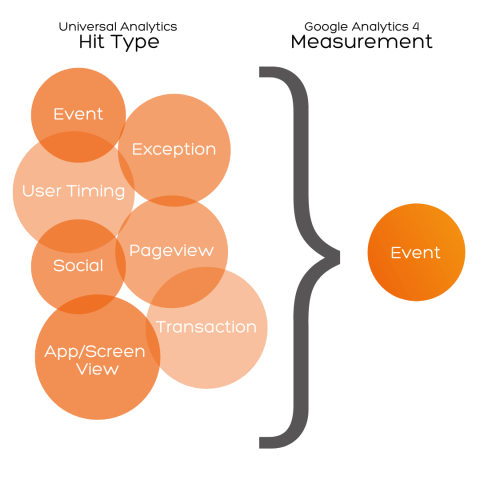For those of you that are used to Universal Analytics (UA) you will have noticed that Google Analytics 4 (GA4) is radically different.
Google Analytics 4 works very differently from its predecessor. Although it comes with many new features, it has also suffered some criticism for perceived bugs and missing some features from Universal Analytics. This blog will talk about the main key differences between Google Analytics 4 and Universal Analytics.
When will Universal Analytics be deprecated?
Google has announced that Universal Analytics will stop processing hits on July 1st, 2023 for standard UA properties.
Different Measuring Models
There are significant differences between how interactions are captured in Universal Analytics and Google Analytics 4.
Universal Analytics uses a session/pageview measurement, while Google Analytics 4 uses an event/parameter model. Interactions are recorded as events. Therefore all Universal Analytics hit types become events in Google Analytics 4.

It is important to note that events are not a new thing in terms of Google Analytics. They also appeared in Universal Analytics. In Universal Analytics each event would have an associated category, action, and label. These no longer exist in Google Analytics 4. The events in Google Analytics 4 have event parameters that are additional pieces of information about the action (event) a user took. Lots of the event parameters are sent automatically, such as page_title. There is the option to add additional events when needed.
As the data models are very different in Google Analytics 4 compared to Universal Analytics, Google recommends that you implement new logic when setting up Google Analytics 4.
Removal of Monthly Hit Limits
Universal Analytics had a monthly limit of 10 million hits. With Google Analytics 4 we have seen the removal of monthly hit limits. Google Analytics 4 does have a limit on the number of different events that can be captured (500).
Free Connection to BigQuery
Finally you can now have a free connection to BigQuery. Previously only GA360 customers were able to access BigQuery free of charge, and this was a major distinction between the free and paid versions of Google Analytics.
If you have not used BigQuery before you should try it out as it enables very large and complex data sets to be queried extremely swiftly. By using Big Query it takes the data out of Google Analytics and allows you to gives you the ability to analyse it without the issue of sampling.
Final Thoughts
As can be seen from the above there are a lot of differences between Google Analytics 4 and Universal Analytics. Here at Koozai we recommend that you understand it fully before you switch over completely. We also recommend creating a new property to run alongside Universal Analytics. If you would like to find out more about Google Analytics 4 check out our beginner’s guide to GA4.







Leave a Reply